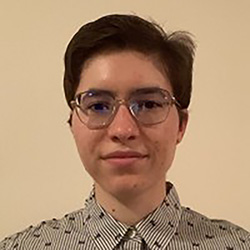Undergraduate Alum Caspar Popova Receives a CSGrad4US Fellowship
As a Northwestern Computer Science undergraduate student immersed in research projects, Caspar Popova (’22) knew he ultimately wanted to pursue a doctoral degree, but he wasn’t ready to commit to a PhD program immediately after graduating.
Following a year as a lead developer in population health analytics with healthcare software company Epic, Popova earned a National Science Foundation (NSF) Directorate for Computer and Information Science and Engineering (CISE) Graduate Fellowship (CSGrad4US). He is currently applying to PhD programs in programming languages (PL), software engineering, and compilers for admission in fall 2024.
At Epic, Popova manages an investigation to determine the multi-year strategic direction of an analytics framework and maintains the system infrastructure. He is also working on a CMS-HCC analytics project to build new reporting content.”
 “Since graduation, I have been working on my investigation, documentation, project management, and mentoring skills,” Popova said.
“Since graduation, I have been working on my investigation, documentation, project management, and mentoring skills,” Popova said.
Launched in 2021, the CSGrad4US Fellowship aims to increase the number and diversity of graduate students pursuing research and innovation careers in computer science, computer engineering, and information science. The program supports support early-career individuals with academic and industrial accomplishments — including a minimum of one year of practical career experience — that illustrate their demonstrated potential for significant research achievement in a doctoral degree program.
Popova is among the third cohort of CSGrad4US recipients. A total of 71 fellows have enrolled in a qualifying doctorate program as of spring 2023.
Advised by Christos Dimoulas, assistant professor of computer science at Northwestern Engineering, Popova served as a research assistant in the CS Programming Languages Group. He collaborated with PhD student Lukas Lazarek on a project to evaluate the usefulness of error-reporting features like blame in mixed typed languages such as TypeScript and Typed Racket. Popova earned the Fletcher Prize for Rising Undergraduate Research Star through Northwestern’s Office of Undergraduate Research in summer 2021.
In addition, Popova managed an independent study research project, completed graduate-level PL courses, participated in group paper readings, presented research at an undergraduate research showcase event, and worked with Arcana, a compiler research group led by Simone Campanoni, associate professor of computer science and (by courtesy) electrical and computer engineering at the McCormick School of Engineering.
“I am very thankful for my adviser, Professor Dimoulas, for pushing me to apply for this program and helping me plan my research path beyond undergraduate studies,” Popova said.
Currently in the mentorship phase of the CSGrad4US program — which runs from September through November and is organized by the Computing Research Association’s (CRA) Education Committee and the CRA Committee on Widening Participation in Computing Research — Popova is receiving guidance on the graduate school application process from a CRA-appointed faculty member with expertise in PL doctoral programs.
At the start of the mentoring program, Popova was primarily focused on how to identify potential PhD advisers.
“If you don't have a lot of restrictions, the number of programs that are available can get pretty overwhelming,” Popova said. “That's when it’s important to hone in and understand the subset of programs that are relevant to your interests and requirements. Through the mentorship program, I've learned a lot more about what I didn't consider about the application process, including how to reach out to potential advisers, communicate my research interests, and prioritize decision-making factors.”
Russell Joseph, associate professor of electrical and computer engineering and of computer science at Northwestern Engineering, is a program chair of the CRA’s CSGrad4US Mentoring Program.
Once Popova is enrolled in a PhD program, he will receive three years of CSGrad4US Fellowship funding via a grant provided to his institution, including a stipend and cost-of-education allowance.
“My long-term goals during graduate school are to work on research with impact, such as improving commonly used testing or program verification tools,” Popova said.
